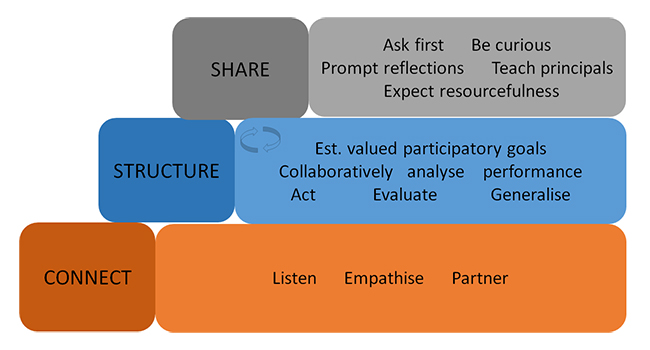 This is the official website for information and resources about Occupational Performance Coaching (OPC) intervention and the OPC Network of OPC researchers and trainers.
This is the official website for information and resources about Occupational Performance Coaching (OPC) intervention and the OPC Network of OPC researchers and trainers.
OPC is an evidence-based intervention for rehabilitation specialists to assist people with disabilities and their caregivers to realise their aspirations for themselves, their loved ones, and their families. OPC draws from core principles of occupational therapy that people learn, develop and grow from doing the things they value as fully as they wish and are able.
OPC was originally developed for occupational therapists to assist parents of children with developmental disabilities, but OPC is now used by multiple rehabilitation professions to support people of all ages, and with diverse health conditions, to achieve personally valued change in life domains.

OPC: Three Enabling Domains
Three enabling domains of Occupational Performance Coaching. First published Graham, F. (2020), Occupational Performance Coaching Resources. This work is licensed under a Creative Commons Attribution-NonCommercial-NoDerivatives 4.0 International License. University of Otago.
OPC has been described in detail in multiple peer reviewed journal articles, book chapters and workshops. A manual describing OPC in detail, including research processes is also available.
History
OPC was developed by Dr Fiona Graham, Professor Sylvia Rodger and Professor Jenny Ziviani as part of Dr Fiona Graham's PhD studies at the University of Queensland. Dr Fiona Graham lives and works from Christchurch, New Zealand. She is an academic with the University of Otago, teaching postgraduate interprofessional rehabilitation. Professor Jenny Ziviani continues to work at the University of Queensland. Sadly, Professor Sylvia Rodger passed away in 2017.
Who is OPC for
Research now indicates that OPC can be effective in improving participation in everyday life with children who have a wide range of health conditions and learning disabilities. OPC can also be helpful in assisting adults after stroke and after traumatic brain injury to resume active, meaningful lives in the areas valued by clients. Research continues to extend our understanding of who OPC is helpful to, to what extent and under what conditions.
Who can do OPC
OPC is designed for use by rehabilitation professionals including occupational therapists, physiotherapists (physical therapist), speech and language therapists (speech pathologists), teachers, social workers, nurses, and doctors. Specialist training in OPC is available internationally from endorsed OPC trainers.
Using OPC safely
Clinicians who are interested in applying OPC are encouraged to read the available published material on OPC, reflect on and discuss the use of OPC with local colleagues and clients. Clinicians may apply OPC in ways that are congruent with the existing research evidence and local culturally appropriate care.
There is currently no certification for OPC for clinical use. Clinicians are encouraged to self-assess their use of OPC using the OPC fidelity measure, and casenote audit tool available here. And in-depth explanation of fidelity processes for OPC intended for clinicians and researchers is available in the Occupational Performance Coaching Manual (2021).
Frequently Asked Questions
Find the answers to your questions on our FAQs page


